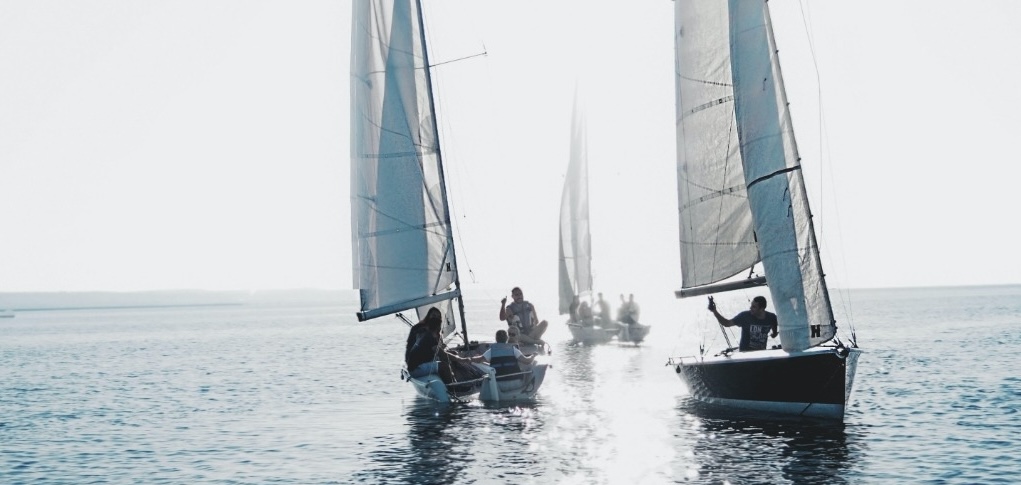SailZoo Blog
Seasickness: What Works – and What Doesn’t?
Seasickness - or motion sickness - can ruin even the most perfect day on the water, especially early in the sailing season or on longer trips when you just want to enjoy the ride. But what actually causes seasickness, and what can you realistically do to avoid or reduce the discomfort? Here's a breakdown of the most effective, evidence-based methods – from medical treatments to natural remedies – trusted by experienced sailors.

Why Do We Get Seasick?
Seasickness occurs when the brain receives conflicting signals from your senses. Your eyes might see a relatively steady environment inside the boat, but your inner ear feels the movement. This mismatch causes dizziness, nausea, and discomfort. Some people are more prone to seasickness than others, often due to genetic sensitivity, individual differences in the vestibular system, or previous experience with motion sickness.
Anxiety, fear, and even the expectation of getting seasick can worsen symptoms. Heavy meals, greasy food, and alcohol can also aggravate the condition. So, it’s wise to stick with light meals before and during your trip and avoid alcohol altogether.
Antihistamines: Only the Drowsy Kind Works
Antihistamines used for allergies won’t help – unless they’re of the drowsy type. Marzine (cyclizine) is one such medication and is effective for seasickness. You can buy it over the counter in most pharmacies.
Scopoderm Patches: Ideal for Long Voyages
Scopoderm patches contain scopolamine, an anticholinergic drug that reduces nerve signals affecting your balance system. You stick it behind your ear, and it works for up to 72 hours. It’s easy to use and favored by many offshore sailors.
Ginger: The Natural Superstar Remedy
Ginger stands out as one of the best natural remedies for seasickness. Active compounds like gingerol and shogaol help stabilize the digestive system and reduce nausea.
In practice, simply chewing a small piece of fresh ginger about 30 minutes before departure (and during the trip) can be effective. Alternatively, try ginger capsules, tea, or lozenges. Fresh ginger is usually most potent, but dried capsules or powder work well too.
Ginger has the added benefit of being free from side effects, which is why many sailors prefer it.
Acupressure Bands: Gentle and Sometimes Effective
Acupressure wristbands target the P6 (Neiguan) point on your inner wrist. Based on traditional Chinese medicine, results from studies are mixed, but many sailors swear by them. They’re non-invasive, easy to wear, and carry no risk of side effects.
Look at the Horizon: Help the Brain Recalibrate
One of the simplest and most effective ways to combat seasickness is to give your brain consistent signals:
- Stay outside and focus on the horizon.
- Stay in the center of the boat, where movement is minimal.
- If possible, take the helm – concentrating on steering can reduce symptoms.
- Avoid reading or looking at screens while underway.
Train Your Balance System Off-Season
You can reduce your sensitivity to motion by training your vestibular system over winter. Activities like swinging, somersaults, trampoline jumping, and headstands help strengthen your balance control.
🧠 Bonus tip: This is based on vestibular rehabilitation, commonly used by physiotherapists to treat dizziness and balance issues.
Unconventional Tips: Earplugs and Salty Snacks
Some sailors recommend putting a single earplug in one ear to mute balance signals. While not backed by solid science, it may help some people based on anecdotal evidence.
Salty chips or snacks may also help calm the stomach for some. They’re easy to digest and help maintain fluid balance. No scientific studies directly support the chips trick, but many sailors – myself included – always keep a tube of Pringles on board.
Conclusion: Combine Strategies for Best Results
There are also some more unconventional remedies that some sailors swear by. For example, wearing a single earplug in one ear is said to dampen balance signals. However, this tip is mostly based on personal anecdotes and lacks solid scientific backing.
Salty chips or other salty snacks can help calm the stomach for many (myself included – I always have a tube of Pringles on board), as they're easy to digest and help stabilize fluid balance. While there's no direct evidence that chips specifically relieve seasickness, many find them helpful in easing nausea while sailing.
Source:
📚Sundhed.dk – "Transport- og søsyge"
📚 Ernst & Pittler (2000), British Journal of Anaesthesia – "Efficacy of ginger for nausea and vomiting"
📚 Cochrane Review (2015) – "Interventions for preventing nausea and vomiting"
Source:
📚Sundhed.dk – "Transport- og søsyge"
📚 Ernst & Pittler (2000), British Journal of Anaesthesia – "Efficacy of ginger for nausea and vomiting"
📚 Cochrane Review (2015) – "Interventions for preventing nausea and vomiting"
Professional Assistance: Find Boating Experts on SailZoo
Inspecting a boat on your own can be overwhelming, but help is just a click away. On SailZoo, you can:
- Find Professionals: Boat mechanics, marine electricians, riggers, and boat surveyors, categorized by expertise and location.
- Read Reviews: Check ratings and feedback from other boat owners to find the best experts.
- Book Directly: Simple and quick booking to save time and effort.
Are you a maritime company? Register here for free!
Written by Mads SailZoo day 11. June 2025

Sign up for newsletter
Stay tuned for new sailing articles, sailing industry news and early access to new features.
Also see








.png/)


.png/)




.png/)


